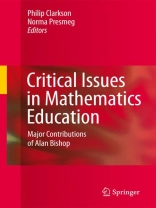Critical Issues in Mathematics Education presents the significant contributions of Professor Alan Bishop within the mathematics education research community. Six critical issues, each of which have had paramount importance in the development of mathematics education research, are reviewed and include a discussion of current developments in each area.
Teacher decision making, spatial/visualizing geometry, teachers and research, cultural/social aspects of mathematics education, sociopolitical issues, and values serve as the basic issues discussed in this examination of mathematics education over the last fifty years during which Professor Bishop has been active in the field.
A comprehensive discussion of each of these topics is realized by offering the reader a classic research contribution of Professor Bishop’s together with commentary and invited chapters from leading experts in the field of mathematics education.
Critical Issues in Mathematics Education will make an invaluable contribution to the ongoing reflection of mathematic education researchers worldwide, but also to policy makers and teacher educators who wish to understand some of the key issues with which mathematics education has been and still is concerned, and the context within which Professor Bishop’s key contributions to these research issues were made.
สารบัญ
Developing a Festschrift with a Difference.- In Conversation with Alan Bishop.- Teacher Decision Making.- Decision-Making, the Intervening Variable.- Teachers’ Decision Making: from Alan J. Bishop to Today.- Spatial Abilities, Visualization, and Geometry.- Spatial Abilities and Mathematics Education – A Review.- Spatial Abilities Research as a Foundation for Visualization in Teaching and Learning Mathematics.- Spatial Abilities, Mathematics, Culture, and the Papua New Guinea Experience.- Cultural and Social Aspects.- Visualising and Mathematics in a Pre-Technological Culture.- Cultural and Social Aspects of Mathematics Education: Responding to Bishop’s Challenge.- Chinese Culture, Islamic Culture, and Mathematics Education.- Social and Political Aspects.- Mathematical Power to the People.- Mathematical Power as Political Power – The Politics of Mathematics Education.- Teachers and Research.- Research, Effectiveness, and the Practitioners’ World.- Practicing Research and Researching Practice.- Reflexivity, Effectiveness, and the Interaction of Researcher and Practitioner Worlds.- Values.- Mathematics Teaching and Values Education – An Intersection in Need of Research.- Valuing Values in Mathematics Education.












